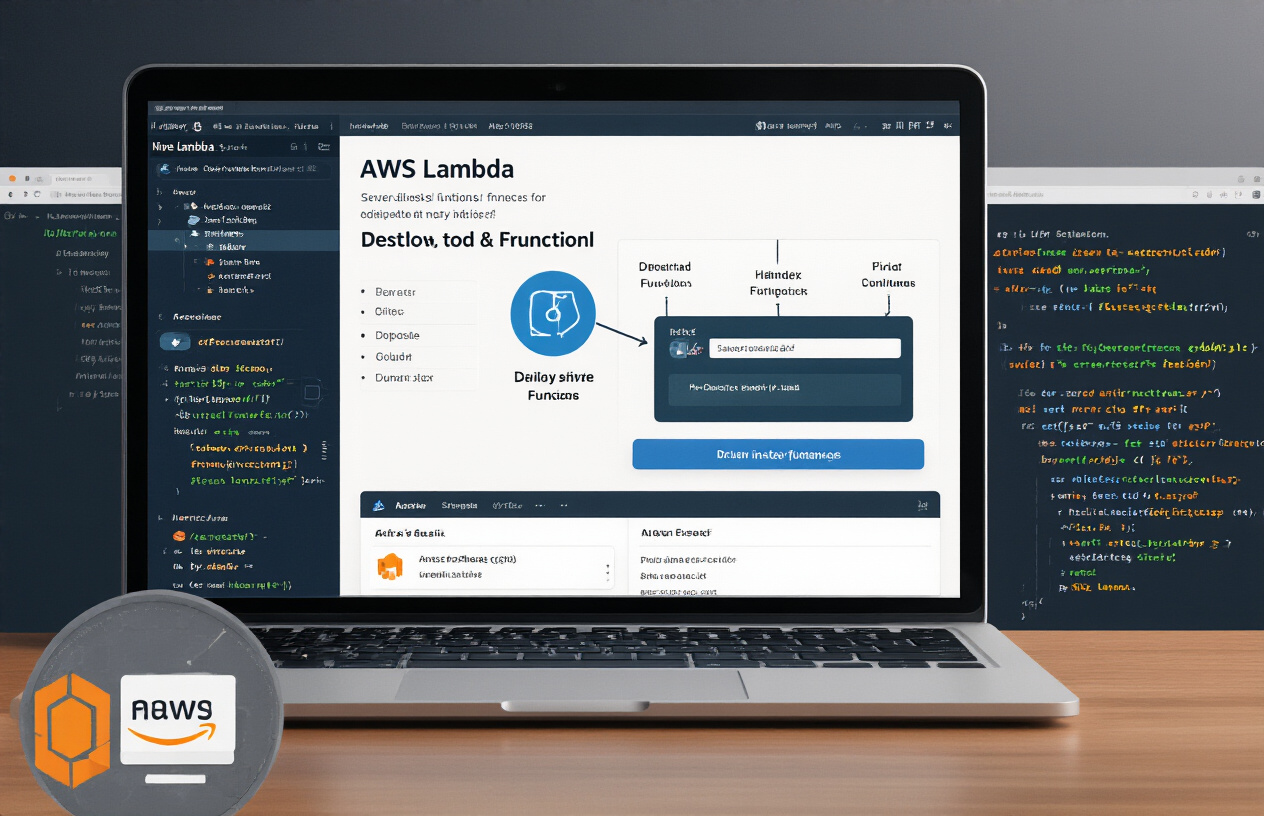Working with string data in AWS Step Functions often requires converting it to JSON format for downstream processing. This guide helps developers and cloud engineers who build serverless workflows understand how to transform string data using both Pass and Lambda states effectively.
You’ll learn two main approaches for AWS Step Functions string to JSON conversion. First, we’ll explore how Pass state JSON transformation works for straightforward data restructuring without additional compute resources. Then, we’ll dive into Lambda state string processing for complex parsing scenarios that require custom logic and error handling.
We’ll also cover practical implementation patterns and help you decide when to use each approach based on your specific Step Functions data transformation needs.
Understanding String to JSON Conversion Challenges in AWS Step Functions
Common data format mismatches in serverless workflows
AWS Step Functions workflows frequently encounter string to JSON conversion challenges when integrating disparate services. Input data arrives as stringified JSON from APIs, databases, or external systems, requiring transformation before processing. Lambda functions often return serialized responses that need parsing, while DynamoDB outputs complex nested structures as strings. These mismatches create bottlenecks in Step Functions state machine JSON operations, forcing developers to implement custom parsing logic that impacts workflow efficiency and reliability.
Performance implications of inefficient string processing
Inefficient AWS Step Functions string to JSON conversion directly impacts execution performance and workflow latency. Each unnecessary Lambda invocation for simple string parsing adds 50-100ms overhead plus cold start delays. Pass state JSON transformation handles basic conversions instantly without compute costs, while Lambda state string processing should reserve complex operations. Poor conversion strategies create cascading delays across dependent states, multiplying execution time and reducing overall throughput in serverless string processing AWS environments.
Cost optimization through proper data transformation strategies
Strategic data transformation planning significantly reduces AWS Step Functions costs through intelligent state selection. Pass states handle Step Functions input transformation at zero compute cost for simple JSON parsing operations, while Lambda functions incur charges per invocation and duration. Proper AWS workflow JSON conversion patterns minimize unnecessary function calls, reducing both execution costs and state transition fees. Organizations save 60-80% on transformation costs by leveraging Pass states for basic string manipulation and reserving Lambda for complex processing requirements.
Leveraging Pass States for Simple String to JSON Transformations
Built-in intrinsic functions for basic JSON manipulation
Pass states offer powerful built-in intrinsic functions that handle JSON transformations without external compute resources. These functions work directly within the state machine definition, providing immediate string-to-JSON conversion capabilities. The States.StringToJson function parses stringified JSON data, while States.JsonToString reverses the process. Additional functions like States.JsonMerge combine JSON objects, and States.Base64Encode/Decode handle encoded string data transformations.
States.StringToJson function implementation and syntax
The States.StringToJson function transforms string representations into proper JSON objects within your AWS Step Functions workflow. Implementation requires simple syntax in your state definition’s Parameters block. Here’s the basic structure:
{
"Type": "Pass",
"Parameters": {
"ParsedData.$": "States.StringToJson($.inputString)"
}
}
The function accepts JSONPath expressions referencing string data in your state input. When processing, it validates the string format and converts valid JSON strings into structured objects. Error handling occurs automatically – malformed strings trigger execution failures with descriptive error messages. You can combine this function with other intrinsic functions for complex transformations.
Performance benefits and limitations of Pass state approach
Pass states deliver exceptional performance advantages for AWS Step Functions string to JSON conversion tasks. They execute instantly without cold start delays, consuming zero compute resources beyond the state machine itself. This approach eliminates Lambda invocation overhead, reducing both latency and costs significantly. Pass states process transformations in milliseconds compared to Lambda’s potential seconds.
However, limitations exist for complex scenarios. Pass states handle only basic JSON parsing operations without custom validation logic. They cannot perform advanced string manipulation, regex processing, or conditional transformations. Memory constraints apply to large JSON strings, and error handling remains basic compared to Lambda state flexibility.
Real-world use cases where Pass states excel
E-commerce platforms benefit from Pass states when processing customer order data received as JSON strings from external APIs. Payment processing workflows use Pass states to transform stringified transaction responses into structured objects for downstream validation. IoT applications leverage Pass states for converting sensor data strings into JSON objects before routing to different processing branches.
Configuration management scenarios excel with Pass states when parsing environment-specific JSON strings into usable parameters. Webhook processing workflows use Pass states to transform incoming string payloads into proper JSON structures. Data pipeline orchestration benefits when converting ETL job results from string format into structured JSON for further processing steps.
Implementing Lambda States for Complex String Processing
Custom transformation logic for advanced JSON conversion
When your string data contains complex nested structures, arrays, or requires conditional parsing logic, Lambda functions become essential for AWS Step Functions string to JSON conversion. Custom Lambda functions can handle irregular string formats, perform data validation, apply business rules during transformation, and execute multi-step parsing operations that Pass states simply cannot accommodate.
Error handling and validation in Lambda functions
Robust Lambda state string processing requires comprehensive error handling mechanisms including try-catch blocks, input validation checks, and graceful failure responses. Your Lambda function should validate string format before parsing, catch JSON parsing exceptions, return standardized error objects, and log detailed error information for debugging purposes while maintaining Step Functions data transformation workflow continuity.
Memory and timeout optimization strategies
AWS Step Functions JSON parsing performance depends on properly configured Lambda resources. For simple string transformations, use 128MB memory with 30-second timeouts. Complex parsing operations may require 512MB-1GB memory allocation. Monitor CloudWatch metrics to identify optimal configurations, implement connection pooling for external dependencies, and consider async processing patterns for large datasets to minimize execution costs.
Integration patterns with downstream Step Function states
Successful serverless string processing AWS implementations require careful consideration of output formatting for subsequent states. Design Lambda responses to match expected input schemas of downstream states, implement consistent error handling patterns that work with Step Functions retry logic, use ResultPath to preserve original input data alongside transformed JSON, and leverage Choice states for conditional processing based on transformation results.
Cost-benefit analysis of Lambda vs Pass state approaches
Step Functions input transformation cost optimization requires strategic decision-making between Pass and Lambda states. Pass states incur zero additional compute costs but offer limited transformation capabilities. Lambda states provide unlimited flexibility at $0.0000166667 per GB-second plus Step Functions state transition costs. Choose Pass states for simple string manipulations and static transformations, while Lambda states justify their cost for complex parsing, validation, and dynamic transformation scenarios.
Best Practices for Choosing Between Pass and Lambda States
Decision matrix for transformation complexity assessment
When deciding between Pass states and Lambda functions for AWS Step Functions string to JSON conversion, evaluate transformation complexity first. Simple string replacements, basic property mapping, and static JSON structure creation work perfectly with Pass states. Complex parsing requirements, dynamic field validation, error handling logic, and conditional transformations demand Lambda states. Consider data volume – Pass states handle lightweight Step Functions input transformation efficiently, while Lambda states excel with heavy processing loads and serverless string processing AWS scenarios.
Performance benchmarking and monitoring strategies
Monitor Step Functions data transformation performance using CloudWatch metrics focusing on state execution duration and memory consumption. Pass states typically execute in milliseconds with zero cold start overhead, making them ideal for AWS Step Functions JSON parsing in real-time workflows. Lambda states introduce 50-200ms cold start latency but provide superior processing power for complex string to JSON AWS serverless operations. Set up X-Ray tracing to identify bottlenecks in AWS workflow JSON conversion pipelines and establish baseline performance metrics for both approaches.
Scalability considerations for high-volume workflows
Pass states scale automatically without throttling limits, making them perfect for Step Functions state machine JSON operations at massive scale. Lambda states face concurrent execution limits (1000 default) and require careful capacity planning for high-throughput Lambda state string processing. Design Pass state JSON transformation patterns for predictable workloads exceeding 10,000 executions per minute. Implement circuit breaker patterns and retry logic when using Lambda states for Step Functions JSON parsing to handle scaling constraints gracefully while maintaining workflow reliability.
Implementation Examples and Code Patterns
Step-by-step Pass state configuration with real JSON examples
Pass states excel at transforming string data into structured JSON through intrinsic functions. The States.StringToJson function converts properly escaped JSON strings directly within your state machine definition. Configure your Pass state with "Type": "Pass" and use "Parameters" to define the transformation. For example, transform "{\"name\":\"John\",\"age\":30}" by setting "ParsedData.$": "States.StringToJson($.inputString)". The ResultPath property controls where the converted JSON appears in your state output, while InputPath can filter incoming data before processing.
Lambda function templates for common string transformation scenarios
Lambda functions handle complex string to JSON conversions that Pass states can’t manage. Create a Python function using json.loads() for basic parsing, wrapping it in try-catch blocks for error handling. For CSV-to-JSON conversion, use the csv.DictReader to process each row into dictionary format. When dealing with malformed JSON strings, implement cleaning logic to remove invalid characters before parsing. Node.js templates work similarly with JSON.parse() and appropriate error handling. These Lambda functions integrate seamlessly into Step Functions workflows through the Lambda state type.
Error handling patterns and retry mechanisms
Robust error handling prevents workflow failures during string to JSON conversion. Configure retry mechanisms in your state definition using "Retry" blocks with exponential backoff for States.TaskFailed and States.ALL error types. Set maximum attempts to prevent infinite loops. Use "Catch" blocks to redirect failed transformations to alternate processing paths or error notification states. For Pass states, catch States.IntrinsicFailure errors specifically. Lambda functions should return structured error responses that Step Functions can interpret, including error codes and descriptive messages for debugging.
Testing and debugging techniques for both approaches
Test your AWS Step Functions string to JSON conversion using the Step Functions console’s execution history view. Enable CloudWatch Logs integration to capture detailed execution traces and input/output data at each state. For Pass states, verify your intrinsic function syntax using the Step Functions simulator before deployment. Lambda functions benefit from local testing with sample string inputs that match your expected data formats. Use Step Functions’ visual workflow designer to trace data flow and identify transformation bottlenecks. CloudWatch metrics help monitor error rates and execution duration for performance optimization.
Converting string data to JSON format in AWS Step Functions doesn’t have to be complicated once you understand your options. Pass states work perfectly for straightforward transformations where you need to restructure existing data, while Lambda states shine when you’re dealing with complex parsing, validation, or multiple data sources. The key is matching your approach to your specific use case rather than defaulting to the most complex solution.
Start by evaluating your data transformation needs and pick the simplest method that gets the job done. Remember that Pass states keep your workflows lightweight and cost-effective, but don’t hesitate to bring in Lambda functions when you need that extra processing power. With these patterns in your toolkit, you’ll be able to handle any string-to-JSON conversion challenge that comes your way.




















